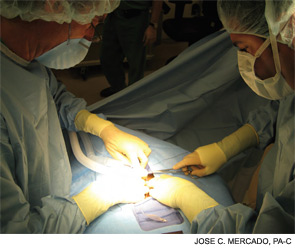The federal government’s proposed rule establishing incentive payments for physicians who “meaningfully use” electronic health records (EHRs) is too onerous and would discourage physicians from participating, some otolaryngologists say.


The federal government’s proposed rule establishing incentive payments for physicians who “meaningfully use” electronic health records (EHRs) is too onerous and would discourage physicians from participating, some otolaryngologists say.


This issue of ENT Today includes an article on the debate over canal-wall-up (CWU) versus canal-wall-down (CWD) tympanomastoidectomy (p. 5). I remember hearing the same arguments when I was a resident at UCLA, which was also the last time I drilled a mastoid bone; my practice focused on head and neck surgery and pediatric otolaryngology. Over the past 32 years, Drs. Bruce Gantz, Rick Chole (two of my otology colleagues on the Board of Otolaryngology), and other otologist friends have suffered through my semi-tongue-in-cheek comments on why otologists can’t agree on which procedure is better. Although the technology used in both procedures has evolved, the final product of the two procedures, a dry, safe ear, is, as best I can tell, the same as it was when I was a resident. I have been told that one of the main factors considered in the decision regarding which procedure to perform is where the otologist trained.

The new health system reform law is expected to reduce the number of uninsured Americans by 32 million people, and that means more paying patients for physician practices. Many doctors, however, worry that the law’s lack of Medicare payment reform and medical malpractice caps will exacerbate a looming physician shortage. This raises questions about how successful the law will be in increasing health care access.

When Winston C. Vaughan, MD, told his Stanford University patients he was leaving academia to establish a private group practice, they had one question: “Are you taking Kathleen with you?” Their concern attests to the integral role that Kathleen Low, RN, NP, fills as a patient-care provider in Dr. Vaughan’s otolaryngology practice.
What is the evidence for different etiologies of sudden sensorineural hearing loss (SSNHL)? Background: The incidence of SSNHL has been estimated from five to 20 per 100,000 persons per year, but […]
Is elective neck dissection the optimal management of the node-negative (N0) neck during salvage surgery after initial treatment with elective nodal irradiation (ENI)? Background: When the neck is seeded at the […]
Can facial attractiveness scores obtained from an Internet-based rating system correlate with and be an alternative for those accrued from the traditional focus group method? Background: Despite the extensive number of […]
What is the efficacy and safety of a five-day moxifloxacin regimen in the treatment of acute bacterial rhinosinusitis (ABRS)? Background: There is a lack of clarity regarding the role of antimicrobials […]
Is exposure to secondhand smoke a risk factor for chronic rhinosinusitis (CRS)? Background: There are surprisingly few studies that address the association between secondhand smoke (SHS) and sinusitis, and most use […]